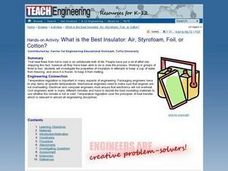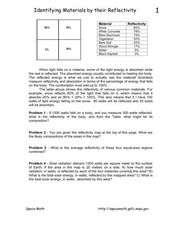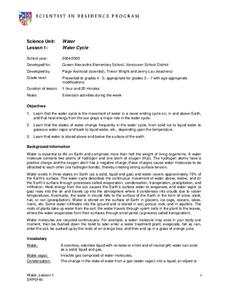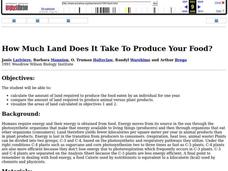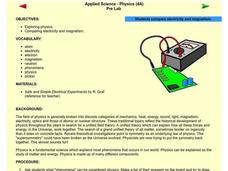Curated OER
Seasonal CEENBoT
Students simulate the Earth's revolution around the sun using CEENBoT. In this earth science instructional activity students calculate the Earth's distance in AU and it's speed of revolution. They explain how the Earth's movement cause...
Curated OER
Good Vibrations Remote Sensing data Collection: Thermal Emission Spectrometer
The Mars Global Surveyor spent two years creating a mineral map of the planet Mars using thermal emission spectrometry. To help young astronomers understand this remote sensing instrument, have them simulate how data is collected and...
Virginia Department of Education
Soap, Slime, and Creative Chromatography
Do you think chromatography paper suffers from separation anxiety? Young chemists make soap, slime, silly putty, and experiment with chromatography in this lesson. The material includes clear instructions for each experiment along with...
Curated OER
Solar
Students study solar energy. In this renewable energy lesson students complete several lab activities using different controls and variables.
Curated OER
The Learning Bottleneck
Students identify and analyze what energy is and how they feel after moving around a lot. They identify other ways that they can acquire heat and if there is some sort of mechanism for storing energy. Finally, students construct their...
Curated OER
Metals and Hydrogen Cars: Chemistry 10-12
Students investigate which metal is best to use as storage material in hydrogen cars. In this chemistry lesson, students differentiate endothermic and exothermic reactions. They write a reflection paragraph about what they learned in the...
Curated OER
TE Activity: Hot Cans and Cold Cans
Learners work on problems in which they investigate conduction, convection, and radiation. They attempt to maintain the warmth in one can of soda while cooling the other as much as possible in a thirty minute period. They examine how...
Curated OER
Solar Cooking
Students experiment with a virtual solar cooker to discover the mathematical relationship among reflection, transmission and absorption. Then they actually build and test a solar cooker of their own invention.
Curated OER
What is the Best Insulator: Air, Styrofoam, Foil, or Cotton?
Students investigate the properties of insulators by attempting to keep a cup of water from freezing, and once it is frozen, to keep it from melting. They conduct the experiment, record and analyze the results, and answer discussion...
Curated OER
Identifying Materials by their Reflectivity
In this reflectivity worksheet, students read about the absorption and reflectivity of light by different materials. Students solve 4 problems and determine the composition of given materials based on the amount of light reflected. They...
Curated OER
Water Cycle
Young scientists explore Earth elements by conducting an experiment. They define water vocabulary terms such as condensation and precipitation. In addition, they conduct a water experiment in which they build a terrarium, so they can...
Curated OER
How Much Land Does It Take To Produce Your Food?
Students calculate the amount of land required to produce the food eaten by an individual for one year. They compare the amount of land required to produce animal versus plant products. Students visualize the areas of land calculated.
Curated OER
Sand or Rock? Finding Out From 1,000 km
Students observe how measurements are made with different instruments. In this remote sensing lesson plan students investigate the physical state of surfaces including the surfaces of the solar system.
Curated OER
What a Drag
Students learn examples of friction and drag, and suggest ways to reduce the impact of these forces. The equation that governs common frictional forces is introduced, and during a hands-on activity, students experimentally measure a...
Curated OER
Striking a Balance
Students simulate animals in a food chain. For this food chain lesson plan, students are identified as grasshoppers, frogs or hawks. Popcorn is spread across a lawn and students are given baggies (stomachs) and colored sashes to identify...
Curated OER
Measuring Calories
Learners burn peanuts and marshmallows to determine the calories each contains. In this calorimetry lesson, students set up an apparatus with a ring stand and water in an aluminum can. They record the temperature of the water before and...
Curated OER
Sun and Earth
Students explore the sun, its structure, how big it is and how far away it is. In this solar system lesson students complete a lab activity on dew point and weather.
Curated OER
The Properties of Metals
In this properties of metals worksheet, students read about the history of metal use and their properties. Students read about metallic bonding and answer three questions about bonding in metals.
Curated OER
Making Clouds: Aerosol-Cloud Interactions in a Beaker
Young scholars observe a teacher demo on how clouds form. In this earth science activity, students discover how cloudiness affects relative humidity. They explain the scattering of light by clouds.
Curated OER
Effects of the Sun on Our Planet (Grades 2-4)
Students observe how the sun's rays can cause evaporation and discuss its role in the weather cycle. They discover what the sun's energy brings to plants. They examine how different types of technology can enhance the amount of solar...
Curated OER
It's in the Bag!
Eighth graders measure temperature changes and make drawings of the interactions between matter and energy. By measuring the temperature students can conclude if there are changes in levels of energy.
.
Curated OER
Exothermic and Endothermic Changes
Pupils define and identify endothermic/exothermic reactions. Using a series of experiments, they construct and interpret potential energy diagrams for their reactions.
Curated OER
What Makes you Hot?
Students manipulate different variables in a model and make inferences about the temperature on Earth. In this heat lesson students calculate the blackbody radiation of an object at a certain temperature.
Curated OER
Electricity and Magnetism
Fourth graders compare electricity and magnetism. In this science lesson, 4th graders discuss the concepts of electricity and magnetism and brainstorm examples of electrical and magnetic forces.










